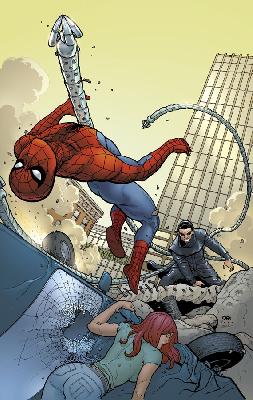I’ve been too busy with cleaning, packing and crankiness to write about comics this weekend, and you can expect that to continue for the next few days at least, though I promise to get back to The Filth and hope it will be sooner than expected.
However I didn’t spend my whole weekend being productive and cranky. I saw Saved! yesterday, and it was much more effective and affecting than I’d expected. Since about age 21, I’ve been fascinated with the way being a teenager is being presented to teenagers, though I no longer think I’ll ever get around to writing this up formally. As a result, I still read some YA and am willing to watch movies that aren’t just standard romances. Because I went to a single-sex Catholic high school and because of who I was while there, I didn’t have anywhere near a normal high school experience, so I’m interested to see what Hollywood thinks normal is, but I’m not well-equipped to judge its relation to reality. I assume that a high school in an area as wealthy as the location in Mean Girls seems to be might have that much conspicuous consumption, and even our uniforms didn’t keep some girls from having visibly nicer cars or haircuts than the rest of us, so I think that’s clear enough. I asked Steven whether couples made out in the halls as in Joan of Arcadia, and he thinks so but wasn’t really paying attention. We had people change clothes basically in the hall after school and probably more offers to lend people tampons than his school did, but I don’t expect to see that in the movies.
Anyway, my point is that the realistic details don’t matter as much as the politics and the heart when I’m looking at these things. Saved! has more heart and better politics than I expected. I know it’s got an audience problem, trying to appeal to Christians and anti-Christians or former Christians alike. But basically it’s not about God any more than Joan of Arcadia is. It’s about what you’ll do to fit in and how that differs from belonging. and the ending, in which everyone remembers that Jesus spoke out in favor of forgiveness and kindness and even those who don’t care about Jesus think that sounds like a good plan, is perhaps predictable but not a cop-out, and each character had to take time and make a decision to love or to reject love. As far as messages go, I’m comfortable with that one, but there’s even more going on.
Unlike in Mean Girls, the gay character actually gets to have a relationship, not just remain a comedy figure checking out all the hot guys. This is an important distinction.
And like in both Mean Girls and Joan of Arcadia, there’s a somewhat androgynous (at least by movie standards) nonconformist who ends up in a romantic relationship with the male nerd character. While in Saved! no one intimated that Cassandra was a lesbian, I think this setup works for several reasons. For one thing, none of them ever denies that bisexuality is an option or that you have to define your orientation for good in high school, which seems like a minor point but will be meaningful to the people who need to hear it, I think. It’s also interesting that nerds (and I count Roland in this group even though Saved! entirely lacks classroom scenes, but I’m working with stereotypes here) are now getting realistic girlfriends rather than none at all, ever, or fantastically attractive airheads, as either comedy or wish-fulfillment fantasy. And it’s good to see that (at least implied) bisexuality isn’t solely the realm of drunken sorority girls looking for attention, which seems to be a common representation.
And the Christians weren’t evil and weren’t perfect. Yes, many things were dumbed-down and mocked, but that’s how it goes in high-school comedy. All of them were struggling and trying to make sense of the world. And that can mean being a gung-ho Christian but not knowing the difference between Moses and Abraham, or being willing to lie to a superior to protect a student’s privacy, or doing bad things in hopes of getting bad people brought to justice, but none of the characters were zombies. They were all trying to do what’s right but first to figure out what’s right and how you can tell.
I realize this probably isn’t much to recommend the movie, but I did enjoy it. The teenagers looked like teenagers, with a few beauties among a lot of awkward classmates. The adults had foibles and blindspots but weren’t hopelessly irrelevant. There were some very funny lines and even though the ending is in many ways ambiguous, it’s more satisfying than if everything had been resolved in explicit detail. The future is open, and that’s the point. It’s time to graduate and move into the real world, where things generally don’t get tied up nicely. And that’s a good thing to know.
